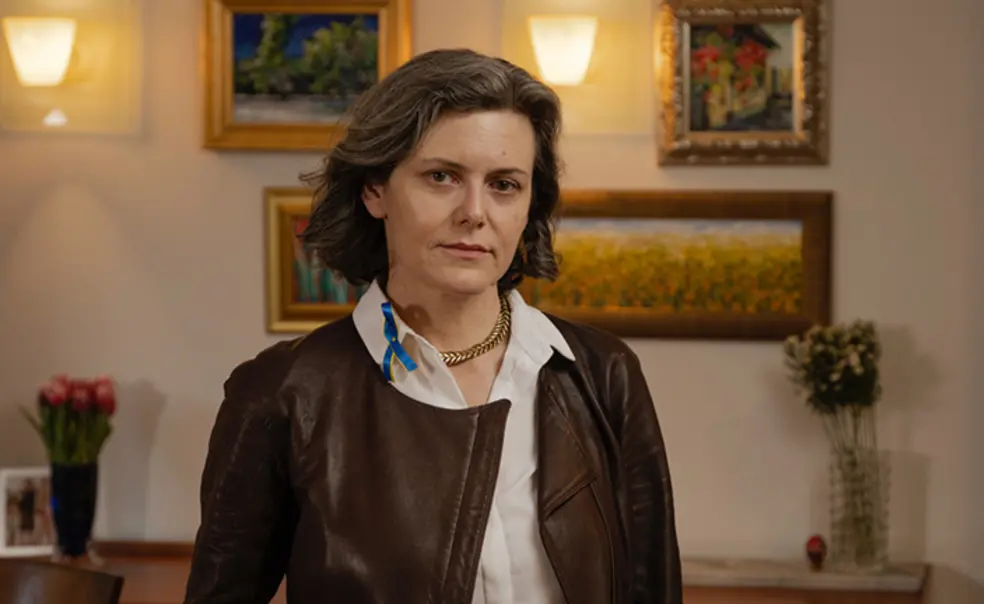Dora Chomiak ’91 Is Supporting Democracy in Ukraine
‘A week before the tanks rolled in, we activated our emergency response fund,’ says Chomiak
Dora Chomiak ’91 is president of Razom for Ukraine, a nonprofit currently providing humanitarian aid to the country besieged by Russia. But her fascination with Ukraine began when she was a child.
She recalls growing up outside of Washington, D.C., knowing that there was a big chunk of her family in Soviet Ukraine with whom she simply couldn’t communicate — at least, not openly — for fear that Soviet authorities would retaliate against those relatives for having contact with the West.
She says the experience stoked in her a desire to be involved. When Chomiak arrived at Princeton in the fall of 1987 — a heady time for those interested in the Cold War — she found a way to be part of the action.
During the summer between her sophomore and junior years at Princeton, Chomiak obtained a visa to participate in a language program in Ukraine and soon found herself crashing at the home of an aunt she’d met for the first time in the city of Lviv, close to the border with Poland.
“Protests and demonstrations were just starting in Ukraine, so it was really exciting,” recalls Chomiak. “People were making change and you could really feel it — you could see it. I got hooked on that.”
When Chomiak returned to Princeton, she devoted her independent work to studying Ukraine. A research grant allowed her to return overseas, and she wrote her senior thesis titled “First Government, Then Power,” analyzing the struggles of Lviv’s newly elected leaders to govern the city after decades of Communist rule.
“Being at Princeton when I was and having to do my independent work really gave me a vehicle to shape something that otherwise I would have squirreled away in a corner as, ‘Oh, just family matters, just family history,’” says Chomiak.
After Princeton, Chomiak returned again to Ukraine. She worked first for the Soros Foundation, then with a group of Ukrainian journalists who received funding to start a news agency called UNIAN and an incubator for media projects called the International Media Center.
Eventually Chomiak returned to the U.S. to attend business school. Her experience in Ukraine had been an education in how to lead others and build organizations from scratch, but she wanted to learn from those who’d come before her about how to run larger media entities. Also, she wanted to be closer to her boyfriend, Darren Chapin ’91, whom she had met at Princeton. They are now married.
Still, after nearly a decade working at publishing giant McGraw Hill, Chomiak’s love of Ukraine and her desire to be involved remained. When the Maidan Revolution started in late 2013, Chomiak came across a group called Razom looking to raise awareness about Ukraine and its struggle for democracy. They reminded her of the entrepreneurial journalists with whom she worked in the early ’90s. She joined as a board member and later became the nonprofit’s president.
“I didn’t want to be just sitting on my hands when all this was happening,” says Chomiak.
In the weeks leading up to the Russian invasion of Ukraine earlier this year, Razom was ready for the worst.
“A week before the tanks rolled in, we activated our emergency response fund,” says Chomiak. “I really wanted us to activate it, collect funds for an emergency and realize there was no emergency.”
That didn’t happen. As of mid-May, Razom has already delivered more than $30 million in humanitarian aid to Ukraine including both in-kind donations and materials Razom procured itself.
“Unfortunately, as long as the bombs keep falling, we need blood clotters and tourniquets, so we’re burning through the money really, really fast,” says Chomiak.












No responses yet